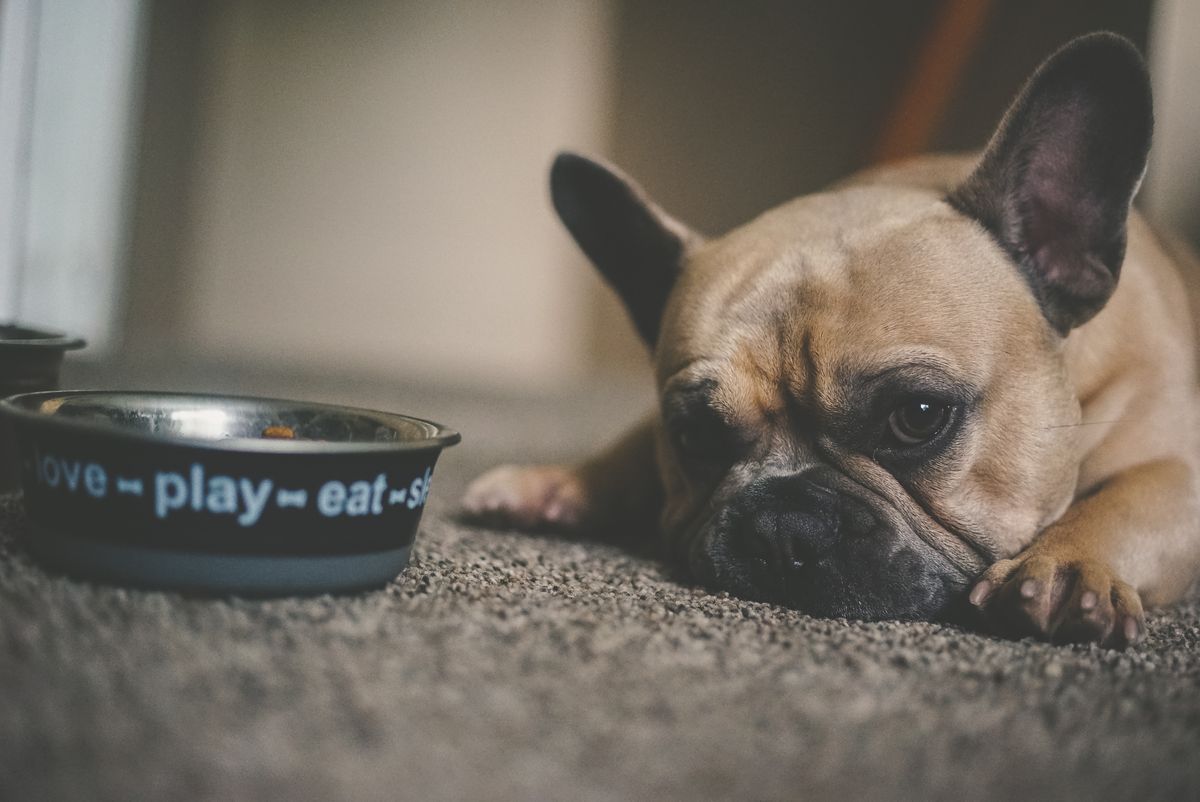
Recommended Article #20January24
Hi, Pet Parents Resources is a platform, where we share with you, what we research as pet parents ourselves. Here, we curate and give, what we hope would be, interesting to important informative articles, videos, and even podcasts from our brand creators, experts, researchers, and more all over the world, to aid you in making better choices for your pets.
This recommended article ''How Long Can A Dog Go Without Eating?'' is curated and sourced from Dogs Naturally Magazine. If you loved this article, please do feel free to share it around.
How Long Can A Dog Go Without Eating?
Do you have a sick dog who won’t touch his food? It can make you worry and wonder … just how long can a dog go without eating?
Here’s the short answer:
Healthy adult dogs can typically go as long as 3 to 5 days without eating any food, as long as they have access to drinking water.
However, this is just an average figure for an adult dog.
Caution: Puppies aren’t covered in this article, but young pups (especially small breeds) under 6 months old need to eat several times a day or they can become dehydrated or hypoglycemic.
Let’s take a closer look at some more specific circumstances for adult dogs not eating.
How Long Can A Small Dog Go Without Eating?
Smaller dogs may not be able to go as long as larger dogs without eating. To err on the side of caution, it’s best to make sure a small dog doesn’t go more than 3 days without eating.
How Long Can a Sick Dog Go Without Eating?
If a dog is sick, especially with a digestive upset of any kind, it’s perfectly normal for him to not eat for a couple of meals, or even a couple of days. Dogs will naturally fast themselves if they don’t feel well, so don’t insist on trying to get him to eat. Giving the digestive system a break with a 12-24 hour fast is a great way to resolve diarrhea.
Still, since not eating can be a sign of more serious conditions, if your sick dog hasn’t eaten in 2-3 days it’s a good idea to talk to your holistic vet.
How Long Can a Dog Go Without Eating After Surgery?
Similarly to sick dogs, dogs who have just gone through surgery may just be disinterested in food for a couple of days. But once your dog falls into that 3-5 day range without eating anything, it’s probably wise to speak to your vet about his condition.
Why is My Dog Not Eating His Food?
Let’s take a closer look at why your dog isn’t eating, and a few things you can do about it.
There are a few reasons for loss of appetite in dogs, and different causes will have different solutions. Since loss of appetite is a common indicator of illness in dogs, you should pay close attention to your dog’s eating habits. If your dog usually eats well but suddenly refuses to eat, it’s often a sign of one of the issues below.
- Pain Or Illness : Loss of appetite is one of the most common signs of illness, especially if it’s accompanied by vomiting, diarrhea, or other symptoms. Just because your dog isn’t eating doesn’t mean he has a serious disease … reduced appetite can also be a sign of dental pain and discomfort from a broken or loose tooth, or gingivitis.
However, if your dog has lost his appetite, it’s still wise to get your vet’s help to find out the cause. Not eating could be a symptom of serious conditions like cancer, liver disease, kidney disease, pain, or systemic infections.
- Vaccinations Or Medications : All vaccines also carry a risk of adverse effects, one of which is a loss of appetite in dogs. Usually, this is minor and brief but if the appetite loss continues, you should contact your veterinarian. Ideally, work with a holistic veterinarian, who’ll be better able to recognize the side effects of vaccination. Veterinary homeopaths are especially skilled at treating vaccine reactions.
Loss of appetite in dogs is also a common symptom of frequently prescribed medications, like antibiotics. Typically these signs will begin to show in a day or two, so pay close attention to your dog if he’s taking any prescription medication.
- Mood, Behavior, or Pickiness : When your dog goes without eating, it isn’t always because of an illness or medical reaction. The explanation may be much simpler. Some dogs are picky eaters, and may not eat at certain times or in situations where they feel uncomfortable or stressed. There can be countless reasons for dog anxiety, such as a new home, travel, house guests and he may need time to adjust. Most dogs will settle down and eat and won’t starve themselves for long!
That said, if your dog’s lack of appetite persists, you’ll want to investigate other possibilities to make sure it’s not a sign of illness.
Why is My Dog Not Eating But Acting Normal?
Occasionally, dogs won’t eat but will continue to act normal. They won’t show other symptoms and will continue to drink water and even eat treats, and have their usual energy for activities and play.
In this case, it’s possible your dog is just suffering from temporary digestive issues. Or, he may simply have decided he no longer likes his food. Consider this possibility if you’ve recently added something new to his food or if you feed a commercial food, the formula or ingredients may have changed.
If your dog isn’t eating but is acting normal, it’s likely to be less serious, but if it doesn’t get better in a few days, it may be time for a food change or a talk with your holistic vet.
What to Do If Your Dog Isn’t Eating
If your dog hasn’t been eating for multiple days, you may need your vet’s help to rule out any illness that needs treatment. The next steps you take will depend on whether or not your dog has a medical issue.
If your dog isn’t eating because he’s become picky, or is uncomfortable with his meal time or is in a new environment, there are a few different approaches you can try.
Here are a few things to try if your dog isn’t eating:
- Change up your dog’s food. If you feed homemade raw or cooked, try a different recipe. If you feed premade raw, try a different protein or brand. Or if you feed processed food like kibble, consider adding or switching to canned dog food.
- Walk your dog before mealtime to stimulate his appetite.
- Change bowls, or where you feed your dog. Your dog may feel more comfortable eating in his crate or in a quiet corner of the home.
- Don’t show your dog you’re stressed by him not eating. Be cheerful and matter of fact when you feed him, and if he’s not interested, just pick up the food and offer it to him later.
- Cut back on the number of meals. Many people feed twice a day, and a lot of picky dogs eat better with only one meal a day.
- Experiment with feeding at different times of day.
- Temporarily cut back or eliminate treats.
- Give pre- and probiotics regularly maintain gut health.
- Give bone broth or raw goat milk to get some nutrients into him.
Finally, try natural options to stimulate appetite, such as CBD oil. Some research suggests it may help stimulate hunger hormones. It can also relieve pain or anxiety if those are the reasons your dog isn’t eating. Despite the potential benefit of CBD oil in stimulating your dog's appetite, unfortunately CBD oil may not be available in some countries due to the local regulation, do be sure to check with your local authorities before involving CBD oil in your protocol.
If your vet concludes your dog isn’t eating because of an illness, you’ll need to treat the problem. Some vets may recommend a prescription diet to make sure your dog is getting enough nutrients. Unfortunately, most prescription diets are poor quality and not good long term options. Instead, try a fresh whole food, preferably raw diet to see if his appetite improves.
It’s not a good idea to force feed your dog, even if he hasn’t eaten for a few days. In extreme cases, your vet might recommend feeding a liquid diet, giving subcutaneous fluids or inserting a feeding tube.
What to Do If Your Dog Hasn’t Eaten For A Week
If your dog hasn’t eaten for a week, it’s definitely time for an immediate vet visit. Healthy dogs can typically only go up to 5 days without eating anything before they start experiencing problems.
You may find more interesting reads from JOOF Holistic Pet today! Look out for loads of information on our product pages, social media, especially our Pet Parent Resources page.
JOOF Holistic Pet, a Singapore online pet store that focuses on the holistic well-being of your beloved furkid. Our recommended products aim to support and improve health, emotional and physical well-being, and help your pet have a better quality of life without compromise. Look out for Essential, Trendy and Premium quality pet products that are specially curated, with the pet parents concerns' as a priority.
This blog first appeared on the Dogs Naturally Magazine website, where this article ''How Long Can A Dog Go Without Eating?'' was curated and sourced from.
Original source: https://www.dogsnaturallymagazine.com/how-long-can-a-dog-go-without-eating/
Thank you for reading! We hope to bring you more informative and exciting articles from other resources and our varying retail brands. Through them, we hope more and more pet parents could become their pet's wellness heroes, proactively taking control of their pets’ foundational health from within, with JOOF Holistic Pet - www.joofholisticpet.sg 😊
Disclaimer:
JOOF Holistic Pet has curated and reproduced this article in good faith, which may contain an element of consumer opinion, but cannot be held responsible for any information inaccuracies in it or any use assumed from this information by the reader. JOOF Holistic Pet welcomes positive recommendations for holistic healthcare products, but does not necessarily endorse the author’s opinion. We acknowledge each animal is an individual and may react differently to the highlighted product/s, and that there may also be other similar effective products available.
General recommendations made by JOOF Holistic Pet are solely for informational and educational purposes, and are not a substitute for the appropriate veterinary care. It is important to always consult professional help if you have concerns about your furkid’s health.
